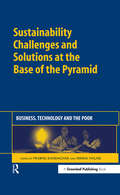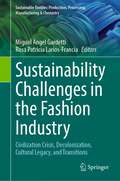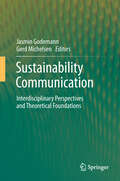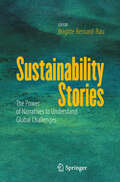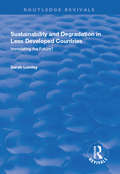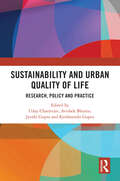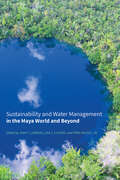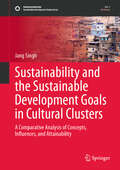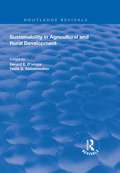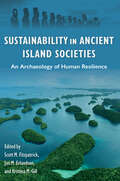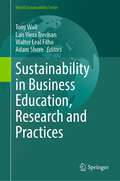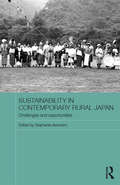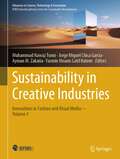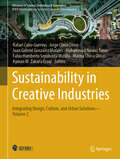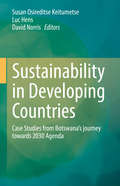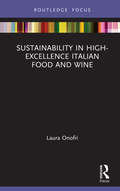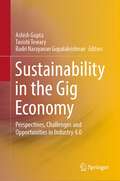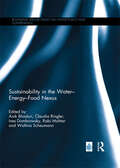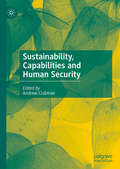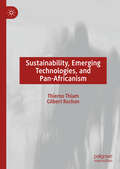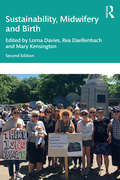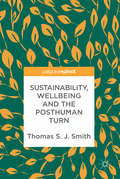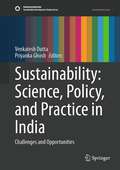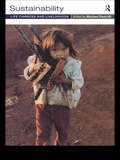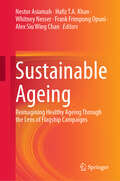- Table View
- List View
Sustainability Challenges and Solutions at the Base of the Pyramid: Business, Technology and the Poor
by Minna Halme Prabhu KandacharAround the turn of the millennium it had become painfully evident that development aid, charity or "global business-as-usual" were not going to be the mechanisms to alleviate global poverty. Today, there is little dispute that poverty remains the most pressing global problem calling for innovative solutions. One recent strategy is the Base of the Pyramid (BoP) concept developed by Prahalad and Hart, which relies on entrepreneurial activity tapping into the previously ignored markets of the economically most disadvantaged. It is a process requiring innovations in several disciplines: technological, social and business.This book covers a number of areas. First, much of the current BoP discussion emphasises targeting products to the needs of the poor. But do we actually know what the real needs of the poor are? This book takes a bottom-up human-centred approach and examines examples that truly engage the poor in BoP product and service development. What types of needs assessment methodologies are indicated considering the cultural differences in BoP countries? Are the existing methodologies adequate? Do they need to be redefined and redeveloped? Second, the book considers how we can balance poverty alleviation and stimulate economic growth without stressing the ecosystem. Tragically, the poor are hardest hit by the adverse effects of environmental deterioration such as water shortages, climate change or the destruction of habitats. While the economic welfare of the poor is critical, the BoP approach must balance its inherent paradox of encouraging greater consumption while avoiding further pressures on environmental sustainability. The link between the BoP approach and sustainable development is a key feature of this book. Third, it looks at innovation and asks what kinds of"bottom-up" innovation (open source, technological, social and business) support BoP initiatives (and sustainable development)?Fourth, the book deals with the relationship between development assistance and BoP. Is a BoP strategy the antithesis to development aid or can these two co-exist or even complement each other?Finally, the book raises questions about the relationship between corporate responsibility and BoP. Is BoP a new form of corporate neo-colonialism or a new form of corporate responsibility? Although the BoP concept has unleashed an extensive and generally enthusiastic response from academics, businesses, NGOs and governments, the knowledge domain around this concept is still in the early stages of development. This book addresses that need with a focus on the needs of the end-users – the poor – as a starting point for BoP products and innovations. With contributions from both supporters and critics, it provides a treasure trove of global knowledge on how the concept has developed, what its successes and failures have been and what promise it holds as a long-term strategy for alleviating poverty and tackling global sustainability.
Sustainability Challenges in the Fashion Industry: Civilization Crisis, Decolonization, Cultural Legacy, and Transitions (Sustainable Textiles: Production, Processing, Manufacturing & Chemistry)
by Miguel Ángel Gardetti Rosa Patricia Larios-FranciaFashion, and the growth of fashion, are presented as the manifestation of a process of civilization, within a capitalist culture (capital understood as material possessions) that has become global and imperialist, of which - in an economic sense - the industry (or the fashion system?) functions as one of its main instruments of exploitation. And with respect to design, Arturo Escobar said: "Can design detach itself from its roots in modernist practices of unsustainability and defuturization and reorient itself towards other commitments, practices, narratives and ontological enactions? Moreover, can design be part of the toolkit for the transition to the pluriverze (i.e. a world in which many worlds can fit)?" This book presents the importance of cultural sustainability in the textiles and fashion industry, decolonizing fashion system and promotes the design for transitions.
Sustainability Communication
by Gerd Michelsen Jasmin GodemannModern and professional communication is required to realise the goal of sustainability in society. This book develops a theoretical and empirical framework, integrating interdisciplinary perspectives from communications theory, psychology, sociology, educational sciences, systems theory and constructivism. Its aim is to inform the establishment of sustainability communication. Complementing this theoretical framework, the book provides methods and concepts in a range of fields such as corporate practice, education and media. The book addresses the scientific community and students as well as communicators in all categories of sustainability communication.
Sustainability Stories: The Power of Narratives to Understand Global Challenges
by Brigitte Bernard-Rau"Sustainability Stories" is an impactful book that offers a global perspective on the grand theme of sustainability. Through the lens of practitioners deeply committed to this cause, the book amplifies sometimes unheard voices, inspiring readers from diverse backgrounds to embrace environmental, social, and financial responsibilities. Each contributor, whether an entrepreneur, professor, lawyer, artist, or sustainability expert, acts as a visionary communicator, forging connections and leading by example. Featuring over 30 narratives from countries such as France, Germany, India, Morocco, Spain, Switzerland, and the United States, "Sustainability Stories" is sure to engage an international audience. Through its pages, this book spreads optimism, determination, and a desire for positive societal change. It empowers readers of all ages and educational backgrounds to join the movement toward a sustainable future. By sharing unique insights and experiences, "Sustainability Stories" serves as a catalyst, inspiring individuals to take action and make a difference in their professional practices, communities and lives.
Sustainability and Degradation in Less Developed Countries: Immolating the Future? (Routledge Revivals Ser.)
by Sarah LumleyThis title was first published in 2002. The concept of sustainable development has increasingly gained currency as a policy determination tool, yet its interpretation and application is widely contested, especially with respect to the role of economics in the facilitation of environmentally and socially sustainable outcomes. Sarah Lumley assesses some of the fundamental assumptions of mainstream economic theory as part of an analysis of farmers' motives in adopting soil conservation on degraded lands in the Philippines. The text has a strong focus on the theoretical and practical interactions between environmental, economic and social aspects of sustainable development; it is both multidisciplinary and transdisciplinary, and draws on conceptually important points of each discipline that it encompasses.
Sustainability and Urban Quality of Life: Research, Policy and Practice
by Uday Chatterjee, Avishek Bhunia, Jyothi Gupta and Krishnendu GuptaThis book conceptualizes and synthesizes worldwide research on the quality of urban life. It looks at quality of life within urban cities analysing amenities, infrastructure and assets while also bringing in the discourse around scarcity, disparity, accessibility, sustainability, equity, and well-being.Organized into four major parts, the book reflects on the interconnections between theories and practice and through a multi-disciplinary approach focuses on the aspects of urban environment and planning that makes cities inclusive, safe, resilient, smart, and sustainable. This book highlights the enormous strain on urban areas due to severe scarcity of civic systems and provides an in-depth look into urban concerns and pressing challenges from a global perspective, as well as many planning approaches to solving these problems.This book will be useful to students, researchers and teachers working in the field of urban studies, remote sensing and GIS, planning and sustainability, sustainable development, urban geography, development geography and population geography. This book would also be an invaluable companion to thought leaders, policy makers and industry and other professionals working in the field of urban planning and human development.
Sustainability and Water Management in the Maya World and Beyond
by Lisa J. Lucero Jean T. Larmon Fred Valdez Jr.Sustainability and Water Management in the Maya World and Beyond investigates climate change and sustainability through time, exploring how political control of water sources, maintenance of sustainable systems, ideological relationships with water, and fluctuations in water availability have affected and been affected by social change. Contributors focus on and build upon earlier investigations of the global diversity of water management systems and the successes and failures of their employment, while applying a multitude of perspectives on sustainability. The volume focuses primarily on the Precolumbian Maya but offers several analogous case studies outside the ancient Maya world that illustrate the pervasiveness of water’s role in sustainability, including an ethnographic study of the sustainability of small-scale, farmer-managed irrigation systems in contemporary New Mexico and the environmental consequences of Angkor’s growth into the world’s most extensive preindustrial settlement. The archaeological record offers rich data on past politics of climate change, while epigraphic and ethnographic data show how integrated the ideological, political, and environmental worlds of the Maya were. While Sustainability and Water Management in the Maya World and Beyond stresses how lessons from the past offer invaluable insight into current approaches of adaptation, it also advances our understanding of those adaptations by making the inevitable discrepancies between past and present climate change less daunting and emphasizing the sustainable negotiations between humans and their surroundings that have been mediated by the changing climate for millennia. It will appeal to students and scholars interested in climate change, sustainability, and water management in the archaeological record. Contributors: Mary Jane Acuña, Wendy Ashmore, Timothy Beach, Jeffrey Brewer, Christopher Carr, Adrian S. Z. Chase, Arlen F. Chase, Diane Z. Chase, Carlos R. Chiriboga, Jennifer Chmilar, Nicholas Dunning, Maurits W. Ertsen, Roland Fletcher, David Friedel, Robert Griffin, Joel D. Gunn, Armando Anaya Hernández, Christian Isendahl, David Lentz, Sheryl Luzzadder-Beach, Dan Penny, Kathryn Reese-Taylor, Michelle Rich, Cynthia Robin, Sylvia Rodríguez, William Saturno, Vernon Scarborough, Payson Sheets, Liwy Grazioso Sierra, Michael Smyth, Sander van der Leeuw, Andrew Wyatt
Sustainability and the Sustainable Development Goals in Cultural Clusters: A Comparative Analysis of Concepts, Influences, and Attainability (Sustainable Development Goals Series)
by Jang SinghThis book examines the three pillars of sustainability (physical environment, social issues, and economic justice) and the progress and achievability of the United Nations’ (UN) 17 Sustainable Development Goals (SDGs) in Canada, Guyana, India, Sri Lanka, and the USA. It presents data from interviews with 41 political and business leaders in these five countries to examine the political and professional effects on sustainability. In addition to the three pillars of sustainability, the author briefly examines the role of religion in sustainability as a potential fourth pillar. The UN SDGs represent minimum targets for the global environmental, economic, and social pillars that underpin a sustainable future for our planet. The data presented in this book combined with the themes uncovered with the SDGs adds to our understanding of how we can potentially influence and achieve these targets and create a sustainable future for the world.
Sustainability in Agricultural and Rural Development (Routledge Revivals)
by Tesfa G. Gebremedhin Gerard E. D'SouzaFirst published in 1998, this book provides a broad but in-depth description of the issues, concepts, methods of analysis, and empirical results related to the sustainable development of agriculture and rural communities. Specifically, it examines the relationships between sustainability and individual topics such as technology, information, population, gender, land use, community, and public policy. A unique aspect of this book is that the topics addressed have not previously been explored together in one publication. With sustainability as the common link, data and evidence are presented and then interpreted in light of individual perspective and experience, in the process advancing our knowledge of this important field. The book comprises of 12 chapters written by prominent authors who come from government and non-government organizations as well as from various academic institutions and disciplines. This book is ideal for a seminar course. It is particularly intended for students in production agriculture, rural sociology, economics and public policy, environmental sciences, geography and land use planning, and other social sciences. Its rich insights make it a useful source of information for policy makers. It can also be used as a reference by professional economists and other researchers interested in issues relating to sustainable agricultural and rural development. While the coverage of some topics is, by necessity, more technical, the book is compiled with a general audience in mind. Thus, it should be of interest to anyone concerned with agriculture, natural resources and rural issues, particularly as they relate to the future of agriculture and of rural communities.
Sustainability in Ancient Island Societies: An Archaeology of Human Resilience (Society and Ecology in Island and Coastal Archaeology)
by Scott M. Fitzpatrick Jon M. Erlandson Kristina M. GillExamining dynamic interactions between humans and island environments This volume explores the impacts humans have made on island and coastal ecosystems and the ways these environments have adapted to anthropogenic changes over the course of millennia. Case studies highlight how island populations developed social and political strategies to effectively manage their ecosystems, ensuring the long-term survival of their societies and the persistence of their cultural traditions. In case studies from islands in the Pacific, the Caribbean, and the Atlantic, contributors apply resilience theory, historical ecology, niche construction theory, and human behavioral ecology to foreground Indigenous resiliency and sustainability. Modern island and coastal societies face daunting challenges in the decades to come, including climate change, sea level rise, and the loss of habitable lands and heritage resources. Sustainability in Ancient Island Societies argues that the study of past human responses to such changes, especially practices rooted in Indigenous traditional ecological knowledge, can inform solutions to manage these threats today.Contributors: Rebecca Boger | Emira Ibrahimpasic | Frederique Valentin | Stuart Bedford | Davide Marco Zori | William Jeffery | Denise Elena | Edith Gonzalez | Mark Horrocks | Anaëlle Jallon | Sophia Perdikaris | Iarowoi Philip | Takaronga Kuautonga | Lindsey E. Cochran | Christopher Wolff | Todd Braje | Craig Shapiro | Allison Bain | Dr. Torben C. Rick | James Flexner | Tim Denham | Jon M. Erlandson | Robert Williams | Victor D. Thompson | Scott M. Fitzpatrick | Julie Field | Kristina M. Gill | Sandrine Grouard A volume in the series Society and Ecology in Island and Coastal Archaeology, edited by Victor D. Thompson and Scott M. Fitzpatrick
Sustainability in Business Education, Research and Practices (World Sustainability Series)
by Walter Leal Filho Tony Wall Laís Viera Trevisan Adam ShoreThe connections between sustainability and business education are becoming increasingly important due to the growing recognition of environmental and social challenges, as well as the role that businesses play in addressing these challenges. Businesses have a significant impact on the environment, society, and the economy. Issues such as climate change, resource depletion, social inequality, and ethical concerns directly affect business operations and performance. Business education needs to equip future leaders with the knowledge and skills to navigate these challenges responsibly. This book provides a platform for the dissemination of information on the latest initiatives and practices in these areas, and promotes future cooperation between universities and business schools across the globe.
Sustainability in Contemporary Rural Japan: Challenges and Opportunities (Routledge Studies in Asia and the Environment)
by Stephanie AssmannRural communities in Japan have suffered from significant depopulation and economic downturn in post-war years. Low birth rates, aging populations, agricultural decline and youth migration to large cities have been compounded by the triple disaster of 11 March 2011, which destroyed farming and fishing communities and left thousands of people homeless. This book identifies these challenges and acknowledges that an era of post-growth has arrived in Japan. Through exploring new forms of regional employment, community empowerment, and reverse migration, the authors address potential opportunities and benefits that may help to create and ensure the quality of life in depopulating areas and post-disaster scenarios. This book will be of interest not only to students of Japanese society, but also to those outside of Japan who are seeking new approaches for tackling depopulation challenges.
Sustainability in Creative Industries: Innovations in Fashion and Visual Media—Volume 3 (Advances in Science, Technology & Innovation)
by Muhammad Nawaz Tunio Yasmin Moanis Latif Hatem Ayman M. Zakaria Jorge Miguel Chica GarciaIn this volume, sustainable creative industries become a beacon for innovative change, forging a path towards a conscious, harmonious world. This volume offers a panoramic view of the future, where innovations in fashion and visual media blend seamlessly with a commitment to a more sustainable and impactful world. More specifically, this volume explores the compelling interplay of sustainability, creativity, and advocacy, casting a spotlight on the transformative potential within fashion and visual media. It embarks on a journey through the innovative landscapes of fashion, where sustainability takes center stage, through an exploration of genderless mode development, contemporary patterns, and reimagined design strategies that breathe new life into tradition. As readers explore the chapters within, the symbiotic relationship between visual media and sustainability emerges, further delve into the evolution of visual communication design and the potency of Instagram microblogs in shaping perceptions and awareness. Furthermore, the role of design in disseminating critical information during disasters is unveiled and the ways in which narrative methods can ignite meaningful change explored.
Sustainability in Creative Industries: Integrating Design, Culture, and Urban Solutions—Volume 2 (Advances in Science, Technology & Innovation)
by Muhammad Nawaz Tunio Jorge Chica-Olmo Rafael Cano-Guervos Juan Gabriel González Morales Fabio Humberto Sepúlveda Murillo Marina Checa Olivas Ayman M. Zakaria EraqiThis book discusses the dynamic interplay of creativity and sustainability in the realm of design, offering a captivating exploration of innovative practices and their environmental impact. From biomimetic inspirations to biophilic designs, it unveils a spectrum of ideas in sustainable architecture. It further dives into inclusive and creative designs, social sustainability for the elderly amid the pandemic. This book casts a spotlight on the intricate synergy between preserving cultural heritage and fostering creative industries. It explores the profound significance of architectural lighting, the innovative reinterpretation of traditional motifs, and the enduring allure of heritage design within its chapters, creating an engaging and thought-provoking journey. Moreover, it ventures into the Integration of Creative Design in Urban Planning, presenting a futuristic outlook that seamlessly blends technology, sustainability, and human-centric solutions. Designed for a wide audience, including professionals, educators, and students, this book is a compelling resource for those passionate about the intersection of creativity and sustainability. It offers thought-provoking ideas, informative case studies, and a glimpse into the future of design that transcends boundaries.
Sustainability in Developing Countries: Case Studies from Botswana’s journey towards 2030 Agenda
by Susan Osireditse Keitumetse David Norris Luc HensThis book illustrates an alternative approach to ‘state of sustainability’ reporting by presenting cross-sectoral and multi-disciplinary discussions on sustainability issues in the context of a developing country, Botswana. The book volume illustrates how academic publishing can supplement African governments' existing forms of reporting on sustainability by providing on-ground detailed descriptions and experiences relating to achievement of the various sustainable development goals (SDGs). In addition, this process involves, increases and enhances diversity of stakeholders that report on sustainability. Furthermore, the approach resonates with the UN’s recommendation to build local strategies for implementation of the 2030 agenda for sustainable development. Conventional reporting on sustainability by most African countries is an exercise that is customarily the preserve of designated government ministries. While this form of reporting provides a consistent platform for tracking sustainable development goals, it can also benefit from juxtaposition with in-depth descriptions and experiences provided by academic publishing. Academia, through publishing, provides a framework for on-ground situation-analysis as well as in-depth descriptions of African country’s grass-root experiences, thus allowing for temporal tracking of sustainable development milestones. As this volume illustrates, experiences from the various contributors on this volume highlight different points of departure towards achieving the 2030 agenda. Topics covered include biodiversity, water management, world heritage, environment, education, tourism, gender, institutional approaches to achievement of SDGs, as well as contribution of non-governmental organisations (NGO)'s amongst others.
Sustainability in High-Excellence Italian Food and Wine (Routledge Focus on Environment and Sustainability)
by Laura OnofriThis book presents contemporary case studies on selected Italian food and wine products to explore how traditional production and consumption models address and adapt to the sustainability challenges in the Italian high-excellence agri-food sector. Sustainability in High-Excellence Italian Food and Wine adopts a transaction cost economics approach, which is applied to five case-study chapters, each focusing on a key Italian agri-food product: Parmigiano Reggiano, Mozzarella di Bufala Campana, Amarone wine, Prosecco wine, and Prosciutto di San Daniele. The production and organization of these products face many challenges as they seek to balance competing priorities around economic viability, maintenance of high-quality standards and environmental and social impacts. The book argues that the development of sustainable and quality models requires changes to the structure and organization of the supply chain while also acknowledging that consumers are increasingly demanding authentic, high-excellence products that require reliable labeling systems and designations of origin mechanism. Recommending that hybrid structures, such as cooperatives and consortia, are the most cost-minimizing governance structures for the production, the book highlights that in the case of Italian excellency food, environmental sustainability and economic efficiency are not actually traded off but are reciprocally valorized through the regulation of high-quality standards. This book will be of great interest to students and scholars of food and wine excellence products, food systems and supply chains, agricultural production and economics and sustainable consumption.
Sustainability in the Gig Economy: Perspectives, Challenges and Opportunities in Industry 4.0
by Ashish Gupta Badri Narayanan Gopalakrishnan Tavishi TewaryThis book provides a comprehensive and contemporary source of reference for the gig economy for sustainable businesses with a focus on Industry 4.0. It covers the theoretical and practical implications of the rise of an alternative system in the era of technology-driven business entities; and explains the emergence of the gig economy as a crucial factor in devising approaches that will help in ensuring better decision making.As the COVID-19 pandemic rages on, investors and corporations are attempting to overcome the turbulence in financial markets over the past few months. Governments and economists are scrambling to mitigate the impacts of lockdowns. Many businesses have transferred to a remote working system, and the critical challenge remains to make this form of work and business productive, efficient, and sustainable. Against this backdrop, the book provides an overview of the gig economy from varied perspective such as general business and economics; ethics, governance, and legal issues; diffusion of IT in the workplace; sustainability; future of workforce and workplaces during and post-pandemic scenarios. This edited volume also highlights several challenges and opportunities for managing the diverse workforce in the prevailing situation which has no precedence.With its discussions on the impact of the gig economy on the business world, the book carries appeal for scholars in the business, human resource professionals, industry practitioners, corporates, and policy advocates interested in learning about evolution, automation, marketing, and sustainability in the gig economy.
Sustainability in the Water-Energy-Food Nexus (Routledge Special Issues on Water Policy and Governance)
by Anik Bhaduri, Claudia Ringler, Ines Dombrowsky, Rabi Mohtar and Waltina ScheumannIt is beyond doubt that the interconnectedness between food, energy, water security and environmental sustainability exists and is getting amplified with increased globalization. It has been recognized that efforts to address only one part of a systemic problem by neglecting other inherently interlinked aspects may not lead to desirable and sustainable outcomes. In this perspective, policy- and decision- making requires a nexus approach that reduces trade-offs and builds synergies across sectors, and helps to reduce costs and increase benefits for humans and nature compared to independent approaches to the management of water, energy, food and the environment. In the past, work related to the Nexus has looked at the interactions between water and food or water and energy, but there has been a reluctance to bring forward a broader systematic perspective that captures the multiple sectors and resource dependencies while understanding its cost to the environment if we neglect these linkages. This book is a compilation of thirteen papers published previously as a special issue of Water International, contains significant pieces of work on the W-E-F nexus focusing on relevant tools, solutions and governance at local and broader human scales.
Sustainability, Capabilities and Human Security
by Andrew CrabtreeAmartya Sen and Martha Nussbaum have made major contributions to development studies and social philosophy, yet sustainability issues have largely remained outside their domain despite sustainability’s significance and complex relation to their central value of freedom. This volume explores sustainability from a capabilities perspective, with the motif of human security, inviting a lively discussion within the human development family. After introducing the two approaches, authors conceptualize relationships between capabilities and the environment, examine the scientific and normative validity of environmental indicators and analyse intergenerational justice. Climate change is used to exemplify that a human security approach can add an explanatory ontology to the ethical criticisms of contemporary ways of life that champion consumerism. That ontology recognizes shared life experiences, problems and life challenges - a community of fate. The volume ends with a discussion of how the approaches can inform and sometimes critique the Sustainable Development Goals.
Sustainability, Emerging Technologies, and Pan-Africanism
by Thierno Thiam Gilbert RochonThis book examines the historical antecedents of Pan-Africanism as a driving force of African Unity, carefully studying its major contributors, current institutional status, and potential future growth. It analyzes the facilitative role of emerging technologies, such as high performance computing, telecommunications, and satellite remote sensing in enabling African sustainable development. Finally, the authors discuss possible ways that the vision of Pan-Africanism can be used today in Africa’s efforts towards unity and sustainable development.
Sustainability, Midwifery and Birth
by Lorna DaviesThis new edition outlines how sustainability can be incorporated into midwifery practice, education and research. It has been thoroughly revised to include new models of sustainable midwifery practice and new chapters on rural midwives and rural communities, social justice, and compassion. Environmental awareness and sustainability are vitally important concepts and, as a low environmental impact healthcare profession, midwifery has the potential to stand as a model of excellence. This international collection of experts explores the challenges, inviting readers to critically reflect on the issues and consider how they could move to effect changes within their own working environments. Divided into three parts, the book discusses: The politics of midwifery and sustainability Midwifery as a sustainable healthcare practice Supporting an ecological approach to parenting. Sustainability, Midwifery and Birth is a vital read for all midwives and midwifery students interested in sustainable practice.
Sustainability, Wellbeing and the Posthuman Turn
by Thomas S. SmithThis book examines how the way we conceive of, or measure, the environment changes the way we interact with it. Thomas Smith posits that environmentalism and sustainable development have become increasingly post-political, characterised by abstraction, and quantification to an unprecedented extent. As such, the book argues that our ways of measuring both the environment, such as through sustainability metrics like footprints and Payments for Ecosystem Services, and society, through gross domestic product and wellbeing measures, play a constitutive and problematic role in how we conceive of ourselves in the world. Subsequently, as the quantified environmental approach drives a dualistic wedge between the human and non-human realms, in its final section the book puts forward recent developments in new materialism and feminist ethics of care as providing practical ways of re-founding sustainable development in a way that firmly acknowledges human-ecological relations. This book will be an invaluable reference for scholars and students in the fields of human geography, political ecology, and environmental sociology.
Sustainability: Challenges and Opportunities (Sustainable Development Goals Series)
by Venkatesh Dutta Priyanka GhoshThis book is an interdisciplinary work that reveals the contemporary sustainability narratives in India within the context of various SDGs. Several case studies are presented, each of which sheds light on the challenges and constraints that are impeding the process of achieving SDGs and investigates potential long-term answers to socio-economic and environmental issues. Through empirical case studies from different parts of India, the book explores the current status of achieving sustainable development goals in India. The volume immensely benefits scientists, researchers, policymakers and practitioners as it offers a thematic and comprehensive understanding of challenges associated with mainstreaming SDGs at national, sub-national, and micro scales in India.
Sustainability: Life Chances and Livelihoods
by Michael RedcliftThe concept of sustainability is traditionally viewed in exclusively environmental terms. Sustainability: Life Chances and Livelihoods links peoples livelihoods and life chances to the concept of sustainability by examining the way in which social and economic processes complement and compound environmental change. Looking at the main ingredients of sustainable development - health, economic policy, land use, ethics and education, in both the north and south, this book demonstrates the way in which the life chances of individuals both effect and are affected by, their environments.Sustainability: Life Chances and Livelihoods shows that the scope of sustainability thinking needs to be widened to embrace public policies and experiences in both developed and developing countries.By providing a comparative focus, both spatially and temporally, the contributors demonstrate how the environmental concerns of the northern developed world are culturally translated into the south, often into immediate survival questions.
Sustainable Ageing: Reimagining Healthy Ageing Through the Lens of Flagship Campaigns
by Hafiz T. A. Khan Nestor Asiamah Whitney Nesser Frank Frimpong Opuni Alex Siu Wing ChanThis book uniquely operationalizes "sustainable ageing" as a concept for reimagining ways by which: (1) social and health threats (i.e., climate change events, extreme industrialization, infectious disease outbreak, and war) can constrain the implementation of healthy ageing campaigns or limit their outcomes, and (2) potential transdisciplinary strategies can be rolled out to optimize healthy ageing through the campaigns in contexts experiencing the threats. The United Nations Decade of Healthy Ageing 2021-2030 initiative drives major healthy ageing campaigns and encapsulates 10 initiatives for enabling people to maintain health as they age. Worsening social and health threats are, however, hindering the implementation of the campaigns. Consequently, healthy ageing may not be achieved or sustained, even in age-friendly contexts experiencing crises. Scholars agree these threats will adversely impact public health and an inclusive multidisciplinary approach to healthy ageing is necessary amidst the threats. This book provides an understanding of how healthy ageing should be framed and approached through the campaigns in a world experiencing crises. Among the topics covered are: Psychology of “Ageing in Place” Amidst Health and Social Threats: Perspectives on the Decade of Healthy Ageing Climate Change Adaptation for Healthy Ageing Research-Practice Gap: Impact on Campaigns and Mitigation Strategies Human Development Pathways for Empowering Older Adults: A Decade of Healthy Ageing Perspective Initiatives to Fight Ageism, Neglect, and Elderly Abuse During Crises: A Healthy Ageing Perspective Sustainable Ageing: Reimagining Healthy Ageing Through the Lens of Flagship Campaigns is a timely publication with broad appeal. Each chapter provides empirical evidence or models for improving stakeholders’ understanding of campaign-related healthy ageing programmes, how the programmes are affected by the threats, and what can be done to achieve the core goals in contexts experiencing threats. Students, lecturers, and researchers can use the book as a research guide, whereas public health professionals and organizations can use it to develop or alter policies. Researchers in a wide range of disciplines can design studies based on models and insights from the book.
